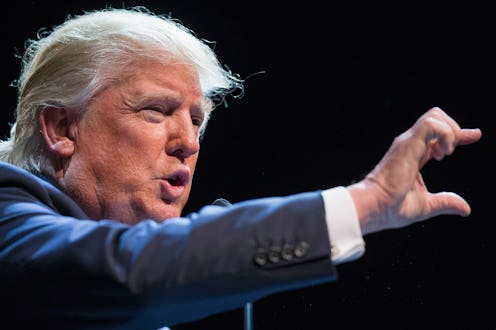News
Trump's Idea To Fight ISIS Is Terrifying
In the aftermath of the Paris terrorist attacks, world leaders have been searching for strategies and improved methods to prevent further terrorism across the globe. The 2016 presidential candidates are no exception— including Donald Trump, who expressed willingness to close mosques in an effort to combat ISIS extremists.
During an interview with MSNBC's Morning Joe, Trump said he felt that mosques should be placed under closer scrutiny, in order to monitor for potential terrorist plots or ISIS ties. According to Trump, if elected president he would seriously consider the idea, and would even take actions to close certain mosques down. "I would hate it do it, but it's something that you're going to have to strongly consider because some of the ideas and some of the hatred, the absolute hatred, is coming from these areas," Trump said.
It's not a new idea for Trump, who endorsed the possibility back in October during an interview with Fox Business. And this time, it appears that he's simply taking his cues from the French. In the aftermath of the coordinated Paris attacks on Friday, French Interior Minister Bernard Cazeneuve promised to continue efforts to close mosques that had ties to the Islamic State or preached hatred. According to The Huffington Post, France's increased mosque surveillance has resulted in the deportation of 40 religious Muslim leaders since 2012 who were found to be "preaching hatred."
While Trump's suggestion isn't necessarily the most dramatic policy he's promised to enact as president, it does have far reaching concerns: namely, the complete rejection of the First Amendment, which protects this thing called freedom of religion. And the concept of invading and possibly shuttering religious spaces definitely flies in the face of this defining American value.
Additionally, this perpetuates the insidious notion that ISIS terrorists and terrorism in general is inherent and always present within Muslim communities. Trump's views can only increase backlash and hatred toward individuals who have done nothing except have their religion bastardized, distorted, and hijacked for evil. And it ignores the fact that ISIS targets Muslims as well — and these individuals probably hate the terrorist organization more than the rest of us do.
Trump doesn't appear to be concerned about this, however. Even when asked whether monitoring and closing mosques could create increased resentment, Trump was dismissive. "There's already hatred. The hatred is incredible. It's embedded," Trump said. "The hatred is beyond belief. It's greater than anybody understands and it's already there. What? You think they think we're great people? It's already there. It's a sad, sad situation."
Racially charged and insensitive comments aside, Trump hasn't stopped to regard the constitutionality of this action — which is particularly surprising for a man who as been an outspoken advocate of the constitutional right to bear arms. The only clear assumption is that Trump, and those who agree with the concept, haven't considered these individuals' right to protection. Such a willingness to violate the Constitution insinuates that Muslims don't fall under the protection of the Constitution. When talking about ISIS or extremists, members of the American Muslim community suddenly cease to be American citizens, and are instead viewed as an "other" and treated as outsiders. In effect, the insinuation is that to be Muslim is to be decidedly not-American, and therefore unworthy of Constitutional protection.
We've seen that Trump is willing to ignore the concerns and benefits of an entire group of people, such as the Mexican immigrants he so desperately wants to deport. But his approach to combating homegrown terrorism isn't just impractical and dangerous to Muslim communities — it's dangerous to all of us.
